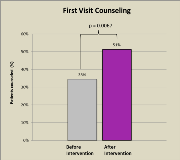Increasing Contraception Counseling by Epileptologists: An Educational and Clinical Intervention
Abstract number :
3.233
Submission category :
4. Clinical Epilepsy / 4E. Women
Year :
2018
Submission ID :
502730
Source :
www.aesnet.org
Presentation date :
12/3/2018 1:55:12 PM
Published date :
Nov 5, 2018, 18:00 PM
Authors :
Runjhun Bhatia, Northwestern University Feinberg School of Medicine; Alyssa Espinera, Northwestern University Feinberg School of Medicine; Elizabeth Bachman, Northwestern University Feinberg School of Medicine; Irena Bellinski, Northwestern University Fei
Rationale: Contraception is an important component of care for women with epilepsy (WWE) of reproductive age. Sixty-five percent of pregnancies in women with epilepsy are unintended. This may be due, in part, to patient and provider unfamiliarity with the interactions between hormonal contraception and AEDs. A recent study demonstrated that in WWE, 32.9% of unintended pregnancies occurred on hormonal contraception and 34.7% occurred when no contraception was being used [1]. Unintended pregnancy is of particular concern in WWE because of the need to optimize seizure control prior to pregnancy to minimize risks to mother and fetus [2]. We previously reported that contraceptive counseling by an epileptologist is associated with patient contraceptive choice; at our institution, WWE were more likely to utilize an IUD if counseling specifically mentioning an IUD was documented in the chart. However 62% of women attended four visits without any documented contraception counseling [3]. Based on these findings, we wanted to see if an educational session and medical record template change could improve contraception counseling in our epilepsy clinic. Methods: In November 2014 we targeted the following interventions towards our epileptologists: 1. An educational session on types of contraception and AED-contraceptive interactions 2. Modification of our EMR template to require physicians to ask women about contraception and plans for pregnancy. To assess the impact of this intervention, we conducted a retrospective chart review of women aged 18-45 seen at our clinic for a first visit between December 2014 and March 2018. Patients who already had an IUD, were surgically sterilized, or were pregnant or planning pregnancy at the first visit were excluded from further analyses. We recorded the type of counseling each patient received and her form of contraception across four visits. We compared this data to previously collected analogous data between 2010 and 2014. A chi square analysis was used to test our primary hypothesis that the set of interventions would increase contraception counseling by epileptologists. Results: Inclusion criteria was met by 130 women. Compared to 35% prior to the intervention, 51% of WWE were counseled about contraception at all at the first visit. The implementation of the intervention and template change was positively associated with counseling (p-value = 0.0067). In an exploratory analysis, we also found that women with intellectual disability (ID) were counseled less often than other WWE; only 31% of women with ID were counseled compared to 62% of WWE without ID (p-value = 0.001). Conclusions: An educational session for epileptologists on effective contraception in WWE and a medical record template change is a set of interventions that increases contraception counseling rates. Further research is needed to understand barriers to counseling in WWE with intellectual disability.ReferencesHerzog et al. Predictors of unintended pregnancy in women with epilepsy. Neurology. 2017;88(8):728-733.Abe et al. Impact of planning of pregnancy in women with epilepsy on seizure control during pregnancy and on maternal and neonatal outcomes. Seizure 2013;23:112–116.Espinera et al. Counseling by epileptologists affects contraceptive choices of women with epilepsy. Epilepsy & Behavior. 2016;65:1-6. Funding: None
